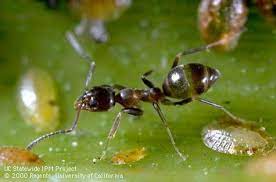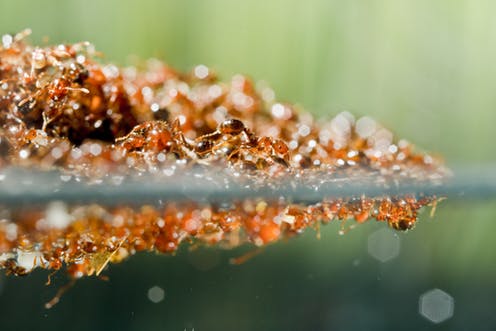Ants are fascinating beings. They possess the ability to lift items that are 100 times heavier than they are and reside in communities that number in the millions. One intriguing puzzle, however, is their survival strategy during rainfall. To stay dry, ants have come up with several clever methods, including coating themselves with soil when it rains and making their homes high in the trees where the chance of getting soaked is lower.
In this blog post, we will explore the various ways ants protect themselves from the dangers of rain!
Contents
How Do Ants Survive Rain?
Ants are one of the most brilliant creatures on earth. Despite being small, these critters are known to be survivors, but can they survive rain? Ants are constantly plagued with droughts, floods, and other environmental disasters. However, these creatures have managed to adapt in ways that allow them to outlast any obstacles thrown at them!
Ants survive rain in various ways; they do so by digging deep down into the soil. When it starts to rain, ants will dig their nests deeper underground to be protected from flooding and heavy rainfall. This helps them survive longer because if water begins pooling around the nest entrance, all of their eggs could be lost.
Another way ants protect themselves is by climbing up high on trees where there’s less chance for precipitation. These ants will find the nearest tree and begin to run up the trunk to avoid any water damage. Again, this works because there is much less chance for rain to reach ants high up on trees than ones living closer to the ground.
How Do Ant Hills Survive Rain?
Ant colonies are known for their amazing teamwork; if one ant decides it’s time to head inside, all other ants will follow suit! These creatures never put others at risk but instead work well together as a unit which is why many ant hills survive the rain.
Anthills, often known as ant mounds, are the ants’ initial line of defense. They usually build their nests out of dirt that absorbs moisture effectively and dries quickly. This is done to help the colony stay safe during heavy rainfall.
Heavy rain, on the other hand, is unavoidable at some point. When this occurs, the second level of defense steps in. Ants construct their nests with a series of short passages that filter and drain rainwater from the inside of the colony.
Multiple air pockets within the passageways aid in keeping water out of the various areas in their nests. If rain penetrates the top layer and drainage tunnels, the air pockets can be used as a vital resource for maintaining the nest dry.
Where Do Ants Go During a Rain?
Many ants seek shelter in their nests during rain, but some ants are more courageous than others. When flooding occurs due to heavy rain, some colonies will travel further distances, searching for a new place to build a colony.
These types of ants are usually known as fire ants or “floating” fire ants. Fire ants are known for their ability to “float” because they have an outer layer of wax that repels water. Fire ants link their legs together and stretch their bodies until they resemble a raft. This allows for them to travel on floodwater without sinking.
Fire ants can last up to hours and even days floating just to find a new home.
Ways to Protect Your Home From Ants During Rain
Ants can be quite the bother if they decide to nest near your home. You may start noticing them crawling across your property or even entering into openings around your exterior which is never a good sign!
If you live in an area that experiences heavy rainfall, you need to protect yourself and your family by preventing ants from nesting underfoot. Here are some great ways to achieve this:
- Caulk cracks and spaces where there could potentially be water damage (i.e., windowsills)
- Fill holes with cement Repair damaged screens
- Place wire mesh over vents and other openings
- Place ant baits and traps in case other methods aren’t working for you
In a Nutshell
There are a few different ways that ants protect themselves from the dangers of rain, and In this blog post, we’ve explored some of these methods! If you want help protecting your home or business against pesky ants, let us know.
Our team can assist with any pest control needs you may have, including ant colonies surviving rain.
Let our ant control experts show how they do what no other company can: make all pests disappear once and for all.



